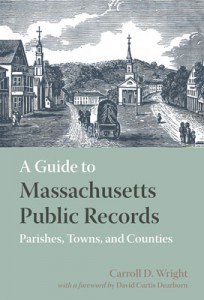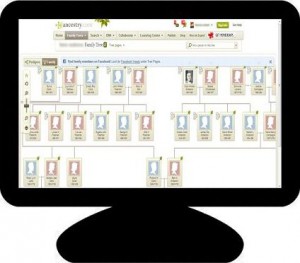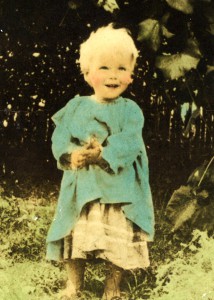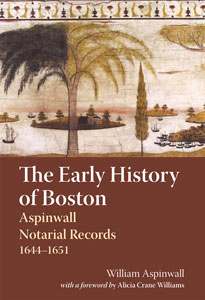 Robert Henry Eddy was a life member of NEHGS who died in 1887 and bequeathed a substantial sum of money to the Society.* Mr. Eddy had been an architect, civil engineer, and in later life, a very successful patent attorney. In 1902, NEHGS used $20,000 of the Eddy bequest to establish the “Eddy Town-Record Fund, for the sole purpose of publishing the Vital Records of the towns of Massachusetts.” This fund would become the basis of a major project to preserve early Massachusetts vital records. Continue reading Who was Robert Henry Eddy, and why should you care?
Robert Henry Eddy was a life member of NEHGS who died in 1887 and bequeathed a substantial sum of money to the Society.* Mr. Eddy had been an architect, civil engineer, and in later life, a very successful patent attorney. In 1902, NEHGS used $20,000 of the Eddy bequest to establish the “Eddy Town-Record Fund, for the sole purpose of publishing the Vital Records of the towns of Massachusetts.” This fund would become the basis of a major project to preserve early Massachusetts vital records. Continue reading Who was Robert Henry Eddy, and why should you care?
Monthly Archives: July 2014
Solving a puzzle using family letters
 The value of family letters can go far beyond the sentimental, providing important genealogical information on extended family and in-laws that may have been previously unknown. But what if, when attempting to piece together this puzzle of information, you are missing its most basic piece: a surname? Continue reading Solving a puzzle using family letters
The value of family letters can go far beyond the sentimental, providing important genealogical information on extended family and in-laws that may have been previously unknown. But what if, when attempting to piece together this puzzle of information, you are missing its most basic piece: a surname? Continue reading Solving a puzzle using family letters
Public Records of Massachusetts Parishes, Towns and Counties
 Despite its relatively small size, Massachusetts arguably has the most complete and comprehensive set of records of historical value of any state. Record-keeping began shortly after the first settlements were established, and for the most part the records have survived to a remarkable degree. The records themselves exist at every level of government: state, county, and town.
Despite its relatively small size, Massachusetts arguably has the most complete and comprehensive set of records of historical value of any state. Record-keeping began shortly after the first settlements were established, and for the most part the records have survived to a remarkable degree. The records themselves exist at every level of government: state, county, and town.
By the mid-nineteenth century, agitation grew for establishing a public records commission, such as existed at the time in England, with the power to bring all the Commonwealth’s important records into a single repository. Other parties objected to this idea, both because of the possible expense involved, but mainly because many local officials objected to giving up custody of their records. Continue reading Public Records of Massachusetts Parishes, Towns and Counties
Brick Walls

My most recent immigrant ancestor was a great-great-grandfather, William Boucher Jr. (1822–1899), who followed his father from Germany to Baltimore in 1845. One generation back, I have three unknown great-great-great-grandparents and a further four who arrived during the late eighteenth and early nineteenth centuries:
- Campbell Patrick White (1787–1859), who went with his parents to Baltimore from Belfast following the Uprising of 1798;
- Henry G. Hughes (c1811–1860) and his wife Olivia Letitia Coulton (c1817–1847), from Ireland to Geneva and Brooklyn, New York; and
- Johann Friedrich Wilhelm Esprit Boucher (b. in 1798), a native of Hamburg who was in New York during the 1830s and in Baltimore (with a second wife and young family) during the 1840s and 1850s.
Cheat Sheets
 I create cheat sheets for projects, but most of them reside inside my head or on scattered pieces of paper in my office – both of which suffer from notorious clutter issues – so it seems like a good exercise to gather and record the process here. In this case, of course, the cheat sheets are for doing research on seventeenth-century New England families, but the basics can be applied to other situations. Also, no search ever progresses exactly the same as any other, so this list is meant to be flexible. Continue reading Cheat Sheets
I create cheat sheets for projects, but most of them reside inside my head or on scattered pieces of paper in my office – both of which suffer from notorious clutter issues – so it seems like a good exercise to gather and record the process here. In this case, of course, the cheat sheets are for doing research on seventeenth-century New England families, but the basics can be applied to other situations. Also, no search ever progresses exactly the same as any other, so this list is meant to be flexible. Continue reading Cheat Sheets
The prisoners of Peddocks Island

The Boston Harbor Islands are popular destinations for camping, sailing, and exploring. Their development and importance to Boston’s history may perhaps be seen most clearly in the well-preserved Fort Warren on Georges Island. An often-overlooked destination among the islands is Peddocks Island, which hosts the remains of Fort Andrews, a defensive compound built at the beginning of the Spanish-American War in 1898. It was named by the land donor Eliza Andrews after her uncle, Civil War brigadier general Leonard Andrews, and was used as a training station for soldiers during World War I and World War II. The structures left today include a barracks, firehouse, stables, gym, and chapel.
Peddocks Island was also used as a prisoner of war camp, in which at least one thousand Italians captured in North Africa were detained following Mussolini’s surrender to the Allied forces in 1943. Continue reading The prisoners of Peddocks Island
Online family trees
 A recent reference question led me on an interesting journey discovering more about online family trees. Using a family tree service on the Web has attractive benefits: a centralized location on the Internet to store your family information, the immediacy of sharing by digital means your information with relatives and potential relatives, the thrill of locating new individuals or information to enhance your tree and further your research, not to mention networking opportunities to really thrash out a stubborn brick wall. Continue reading Online family trees
A recent reference question led me on an interesting journey discovering more about online family trees. Using a family tree service on the Web has attractive benefits: a centralized location on the Internet to store your family information, the immediacy of sharing by digital means your information with relatives and potential relatives, the thrill of locating new individuals or information to enhance your tree and further your research, not to mention networking opportunities to really thrash out a stubborn brick wall. Continue reading Online family trees
Revelations from my recliner: Part Two

Two weeks ago, I wrote about a breakthrough in determining the parentage of my great-grandmother, Orella (Turnbull) Turnbull. While stuck in my recliner for several days with my foot elevated, I made another discovery, about Orella’s husband George.
For years I’ve been sporadically working at tracking down the Turnbulls. They are the only English family in my largely Finnish and Swiss ancestry, and it seems they should be much easier to trace. Continue reading Revelations from my recliner: Part Two
The ‘Do Not Read List’

Jimmy Fallon recently aired his recurring segment, the “Do Not Read List,” which pokes fun at books with unfortunate titles or unconventional subjects. To my surprise, one of the books featured on the spot was the popular genealogical resource, List of Persons Whose Names Have Been Changed in Massachusetts, 1780-1892. Fallon introduced the book with a sarcastic joke: “420 pages of names … changed names. That’s a page turner.” Then, he proceeded to mock those who changed their generic names to something comical. Continue reading The ‘Do Not Read List’
William Aspinwall, Boston notary 1641-51
 Notarization is a legal process meant to deter document fraud. It involves authenticating the person or persons who are signing a document, certifying that they did sign, and keeping records of what was notarized. When the first settlers arrived in New England, there were no banks or law offices where a business agreement could be drawn up, letters of attorney devised, a manifest certified, or a multitude of other legal documents created and authenticated. Continue reading William Aspinwall, Boston notary 1641-51
Notarization is a legal process meant to deter document fraud. It involves authenticating the person or persons who are signing a document, certifying that they did sign, and keeping records of what was notarized. When the first settlers arrived in New England, there were no banks or law offices where a business agreement could be drawn up, letters of attorney devised, a manifest certified, or a multitude of other legal documents created and authenticated. Continue reading William Aspinwall, Boston notary 1641-51